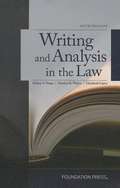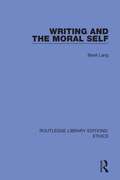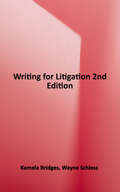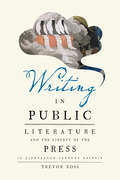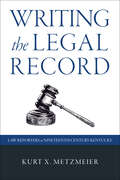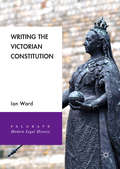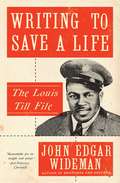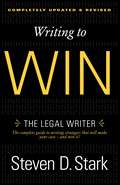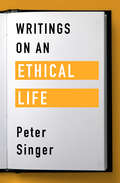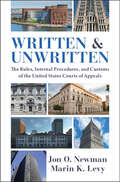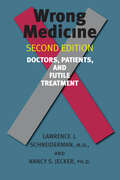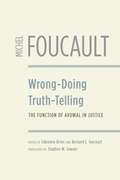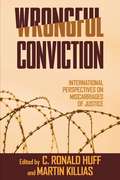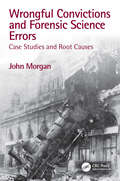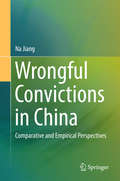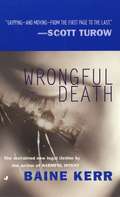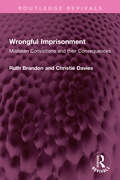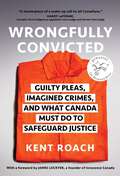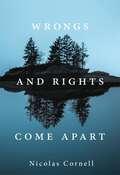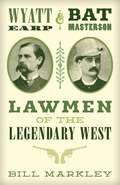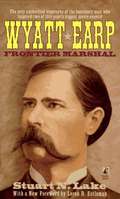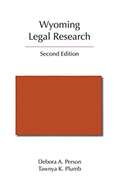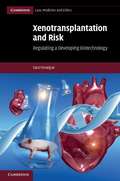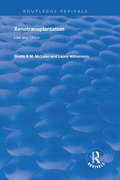- Table View
- List View
Writing and Analysis in the Law, Sixth Edition
by Helene S. Shapo Marilyn R. Walter Elizabeth FajansA standard-setter in American legal education, Writing and Analysis in the Law provides a guide to legal writing, focusing on the importance of clear organization in written communications. Developed as a textbook for a first-year law school course, and is successful in courses for foreign LLM students, the book introduces law students to analyzing and writing about legal authority in cases and statutes. It discusses the structure and persuasive techniques of effective argumentation. The book makes effective use of high-quality and illustrative examples and writing exercises. It also includes access to helpful PowerPoint slides for use in the classroom and class preparation. Lucid, compact, and up-to-date, this work consistently draws acclaim in law schools across the country. <P><P>The sixth edition has been streamlined and designed to be reader friendly: it uses white space, bullet points, tabulation, and headings that chunk information to enable student to grasp information efficiently.
Writing and the Moral Self
by Berel LangOriginally published in 1991, this book analyses the relation between writing and ethics in a number of social contexts – in politics, as language discloses its connections to the institutions of totalitarianism and democracy; in the university, as contemporary scholarly ideals find an uncomfortably accurate representation in the stylistic forms of academic writing; in daily social practice, ranging from the status of truth in journalistic writing to the connection between pronouns and affirmative action; and finally in the ethical structure of language itself.
Writing for Hire
by Catherine L. FiskProfessional writers may earn a tidy living for their work, but they seldom own their writing. Catherine Fisk traces the history of labor relations that defined authorship in film, TV, and advertising in the mid-twentieth century, showing why strikingly different norms of attribution emerged in these overlapping industries.
Writing for Litigation, 2nd Edition
by Kamela Bridges Wayne Schiess"This is a course book for advanced legal writing courses, intended for second- or third-year law students" -- Provided by publisher.
Writing in Public: Literature and the Liberty of the Press in Eighteenth-Century Britain
by Trevor RossWhat is the role of literary writing in democratic society?Building upon his previous work on the emergence of "literature," Trevor Ross offers a history of how the public function of literature changed as a result of developing press freedoms during the period from 1760 to 1810. Writing in Public examines the laws of copyright, defamation, and seditious libel to show what happened to literary writing once certain forms of discourse came to be perceived as public and entitled to freedom from state or private control. Ross argues that—with liberty of expression becoming entrenched as a national value—the legal constraints on speech had to be reconceived, becoming less a set of prohibitions on its content than an arrangement for managing the public sphere. The public was free to speak on any subject, but its speech, jurists believed, had to follow certain ground rules, as formalized in laws aimed at limiting private ownership of culturally significant works, maintaining civility in public discourse, and safeguarding public deliberation from the coercions of propaganda. For speech to be truly free, however, there had to be an enabling exception to the rules. Since the late eighteenth century, Ross suggests, the role of this exception has been performed by the idea of literature. Literature is valued as the form of expression that, in allowing us to say anything and in any form, attests to our liberty. Yet, paradoxically, it is only by occupying no definable place within the public sphere that literature can remain as indeterminate as the public whose self-reinvention it serves.
Writing the Legal Record: Law Reporters in Nineteenth-Century Kentucky
by Kurt X. Metzmeier“Deft sketches of 13 substantial actors in Kentucky’s early history who also happened to have reported appellate cases. They are brought to life.” —Kentucky Bench & BarAny student of American history knows of Washington, Jefferson, and the other statesmen who penned the documents that form the legal foundations of our nation, but many other great minds contributed to the development of the young republic’s judicial system—figures such as William Littell, Ben Monroe, and John J. Marshall. These men, some of Kentucky’s earliest law reporters, are the forgotten trailblazers who helped establish the foundation of the state’s court system.In Writing the Legal Record: Law Reporters in Nineteenth-Century Kentucky, Kurt X. Metzmeier provides portraits of the men whose important yet understudied contributions helped create a new common law inspired by English legal traditions but fully grounded in the decisions of American judges. He profiles individuals such as James Hughes, a Revolutionary War veteran who worked as a legislator to reform confusing property laws inherited from Virginia. Also featured is George M. Bibb, a prominent US senator and the secretary of the treasury under President John Tyler.To shed light on the pioneering individuals responsible for collecting and publishing the early opinions of Kentucky’s highest court, Metzmeier reviews nearly a century of debate over politics, institutional change, human rights, and war. Embodied in the stories of these early reporters are the rich history of the Commonwealth, the essence of its legal system, and the origins of a legal print culture in America.“Kurt Metzmeier’s fine study of the Kentucky court system helps fill in many gaps in our historical knowledge.” —Ohio Valley History
Writing the Victorian Constitution (Palgrave Modern Legal History Ser.)
by Ian WardThis book charts the writing of the English constitution through the work of four of the most influential jurists in the history of English constitutional thought—Edmund Burke, Thomas Babington Macaulay, Walter Bagehot and Albert Venn Dicey. Stretching from the French Revolution to the death of Queen Victoria, their writing is both representative of and formative to the Victorian constitution. Ian Ward traces how constitutional writing changed over the course of the long nineteenth century, from the poetics of Burke and the romance of Macaulay, to the pragmatism of Bagehot and the jurisprudence of Dicey. A century on, our perception of the English constitution is still shaped by this contested history.
Writing to Save a Life: The Louis Till File (Canons #84)
by John Edgar WidemanAn award-winning writer traces the life of the father of iconic Civil Rights martyr Emmett Till--a man who was executed by the Army ten years before Emmett's murder. An evocative and personal exploration of individual and collective memory in America by one of the most formidable Black intellectuals of our time.In 1955, Emmett Till, aged fourteen, traveled from his home in Chicago to visit family in Mississippi. Several weeks later he returned, dead; allegedly he whistled at a white woman. His mother, Mamie, wanted the world to see what had been done to her son. She chose to leave his casket open. Images of her brutalized boy were published widely. While Emmett's story is known, there's a dark side note that's rarely mentioned. Ten years earlier, Emmett's father was executed by the Army for rape and murder. In Writing to Save a Life, John Edgar Wideman searches for Louis Till, a silent victim of American injustice. Wideman's personal interaction with the story began when he learned of Emmett's murder in 1955; Wideman was also fourteen years old. After reading decades later about Louis's execution, he couldn't escape the twin tragedies of father and son, and tells their stories together for the first time. Author of the award-winning Brothers and Keepers, Wideman brings extraordinary insight and a haunting intimacy to this devastating story. An amalgam of research, memoir, and imagination, Writing to Save a Life is completely original in its delivery--an engaging and enlightening conversation between generations, the living and the dead, fathers and sons. Wideman turns seventy-five this year, and he brings the force of his substantial intellect and experience to this beautiful, stirring book, his first nonfiction in fifteen years.
Writing to Win: The Legal Writer
by Steven D. StarkFrom a master teacher, a results-oriented approach to powerful legal writing that communicates, that persuades--and that wins.Of all the professions, the law has the most deserved reputation for opaque, jargon-clogged writing. Legal education, which focuses on judicial opinions, not instruments of persuasion, is partly to blame. Yet forceful writing is one of the most potent weapons of legal advocacy. In Writing to Win, Steve Stark, a former teacher of writing at Harvard Law, who has taught thousands of aspiring and practicing lawyers, has written the only book on the market that applies the universal principles of vigorous prose to the job of making a case--and winning it.Writing to Win focuses on the writing of lawyers, not judges, and includes dozens of examples of effective (and ineffective) real-life writing--as well as models drawn from advertising, journalism, and fiction. It deals with the problems lawyers face in writing, from organization to strengthening and editing prose; teaches ways of improving arguments; addresses litigation and technical writing in all its forms; and covers the writing attorneys must perform in their practice, from memos and letters to briefs and contracts. Each chapter opens with a succinct set of rules for easy reference.No other legal writing book on the market is as practical, as focused on results, as well written as Writing to Win.From the Trade Paperback edition.
Writings on an Ethical Life (Isnm Ser. #Vol. 138)
by Peter SingerThe essential collection of writings by one of the most visionary and daring philosophers of our time Since bursting sensationally into the public consciousness in 1975 with his groundbreaking work Animal Liberation, Peter Singer has remained one of the most provocative ethicists of the modern age. His reputation, built largely on isolated incendiary quotations and outrage-of-the-moment news coverage, has preceded him ever since. Aiming to present a more accurate and thoughtful picture of Singer's pioneering work, Writings on an Ethical Life features twenty-seven excerpts from some of his most lauded and controversial essays and books. The reflections on life, death, murder, vegetarianism, poverty, and ethical living found in these pages come together in a must-read collection for anyone seeking a better understanding of the issues that shape our world today. This ebook features an illustrated biography of Peter Singer, including rare photos from the author's personal collection.
Written and Unwritten: The Rules, Internal Procedures, and Customs of the United States Courts of Appeals
by Jon O. Newman Marin K. LevyAlthough the thirteen United States Courts of Appeals are the final word on 99 percent of all federal cases, there is no detailed account of how these courts operate. How do judges decide which decisions are binding precedents and which are not? Who decides whether appeals are argued orally? What administrative structures do these Courts have? The answers to these and hundreds of other questions are largely unknown, not only to lawyers and legal academics, but by many within the judiciary itself. Written and Unwritten is the first book to provide an inside look at how these courts operate. An unprecedented contribution to the field of judicial administration, the book collects the differing local rules and internal procedures of each Court of Appeals. In-depth interviews of the Chief Judges of all thirteen circuits and surveys of all Clerks of Court reveal previously undisclosed practices and customs.
Wrong Medicine: Doctors, Patients, and Futile Treatment
by Lawrence J. Schneiderman Nancy S. JeckerToo often, patients in American hospitals are subjected to painful, expensive, and futile treatments because of a physician’s notion of medical duty or a family’s demands. Lawrence J. Schneiderman and Nancy S. Jecker renew their call for common sense and realistic expectations in medicine in this revised and updated edition of Wrong Medicine.Written by a physician and a philosopher—both internationally recognized experts in medical ethics—Wrong Medicine addresses key topics that have occupied the media and the courts for the past several decades, including the wrenching Terry Schiavo case. The book combines clear descriptions of ethical principles with real clinical stories to discuss the medical, legal, and political issues that confront doctors today as they seek to provide the best medical care to critically ill patients. The authors have added two chapters that outline theoretical, legislative, judicial, and clinical developments since the first edition. Based on the latest empirical research, Wrong Medicine continues to guide a broad range of health care professionals through the challenges of providing humane end-of-life care.
Wrong-Doing, Truth-Telling: The Function of Avowal in Justice
by Michel Foucault Bernard E. Harcourt edited by Fabienne Brion translated by Stephen W. SawyerThree years before his death, Michel Foucault delivered a series of lectures at the Catholic University of Louvain that until recently remained almost unknown. These lectures--which focus on the role of avowal, or confession, in the determination of truth and justice--provide the missing link between Foucault's early work on madness, delinquency, and sexuality and his later explorations of subjectivity in Greek and Roman antiquity. Ranging broadly from Homer to the twentieth century, Foucault traces the early use of truth-telling in ancient Greece and follows it through to practices of self-examination in monastic times. By the nineteenth century, the avowal of wrongdoing was no longer sufficient to satisfy the call for justice; there remained the question of who the "criminal" was and what formative factors contributed to his wrong-doing. The call for psychiatric expertise marked the birth of the discipline of psychiatry in the nineteenth and twentieth centuries as well as its widespread recognition as the foundation of criminology and modern criminal justice. Published here for the first time, the 1981 lectures have been superbly translated by Stephen W. Sawyer and expertly edited and extensively annotated by Fabienne Brion and Bernard E. Harcourt. They are accompanied by two contemporaneous interviews with Foucault in which he elaborates on a number of the key themes. An essential companion to "Discipline and Punish," "Wrong-Doing, Truth-Telling" will take its place as one of the most significant works of Foucault to appear in decades, and will be necessary reading for all those interested in his thought.
Wrongful Conviction: International Perspectives on Miscarriages of Justice
by Martin Killias C. Ronald HuffImperfections in the criminal justice system have long intrigued the general public and worried scholars and legal practitioners. InWrongful Conviction, criminologists C. Ronald Huff and Martin Killias present an important collection of essays that analyzes cases of injustice across an array of legal systems, with contributors from North America, Europe and Israel. Using this cross-national perspective, the volume offers detailed discussions of specific legal systems while also considering issues that transcend national boundaries. Differences in court procedures are explained as contributors ask what role the respective criminal justice systems play in preventing or generating wrongful convictions. Most importantly, this collection includes a number of well-developed public-policy recommendations intended to reduce the instances of courts punishing innocents. It also offers suggestions for compensating more fairly those who are wrongfully convicted.
Wrongful Convictions and Forensic Science Errors: Case Studies and Root Causes
by John MorganForensic Science Errors and Wrongful Convictions: Case Studies and Root Causes provides a rigorous and detailed examination of two key issues: the continuing problem of wrongful convictions and the role of forensic science in these miscarriages of justice. This comprehensive textbook covers the full breadth of the topic. It looks at each type of evidence, historical factors, system issues, organizational factors, and individual examiners. Forensic science errors may arise at any time from crime scene to courtroom. Probative evidence may be overlooked at the scene of a crime, or the chain of custody may be compromised. Police investigators may misuse or ignore forensic evidence. A poorly-trained examiner may not apply the accepted standards of the discipline or may make unsound interpretations that exceed the limits of generally accepted scientific knowledge. In the courtroom, the forensic scientist may testify outside the standards of the discipline or fail to present exculpatory results. Prosecutors may suppress or mischaracterize evidence, and judges may admit testimony that does not conform to rules of evidence. All too often, the accused will not be afforded an adequate defense—especially given the technical complexities of forensic evidence. These issues do not arise in a vacuum; they result from system issues that are discernable and can be ameliorated. Author John Morgan provides a thorough discussion of the policy, practice, and technical aspects of forensic science errors from a root-cause, scientific analysis perspective. Readers will learn to analyze common issues across cases and jurisdictions, perform basic root cause analysis, and develop systemic reforms. The reader is encouraged to assess cases and issues without regard to preconceived views or prejudicial language. As such, the book reinforces the need to obtain a clear understanding of errors to properly develop a set of effective scientific, procedural, and policy reforms to reduce wrongful convictions and improve forensic integrity and reliability. Written in a format and style accessible to a broad audience, Forensic Science Errors and Wrongful Convictions presents a thorough analysis across all of these issues, supported by detailed case studies and a clear understanding of the scientific basis of the forensic disciplines.
Wrongful Convictions in China
by Na JiangThe primary focus of this comparative and empirical work is to address wrongful convictions between China and common-law countries in order to promote a better understanding of wrongful convictions in China's practice with the help of comparative analyses, verifiable and empirical data and case studies. It examines the scope of wrongful convictions and offers new insights into the worldwide movement to prevent them, assesses how far it has progressed and what reforms are most needed. The book suggests that adversarial and inquisitorial systems alike could benefit from this research and learn valuable lessons from one another on how to effectively reduce the risk of wrongful convictions.
Wrongful Death
by Baine KerrA man crushed between locomotives at a Wyoming switching yard... the mass murder of patients in a hospital in the former Yugoslavia. . . the wrongful death of a comatose woman. As attorney Elliot Stone starts piecing together a three-part Chinese puzzle, one question echoes through it all: How can the good do evil?
Wrongful Imprisonment: Mistaken Convictions and their Consequences (Routledge Revivals)
by Ruth Brandon Christie DaviesFirst published in 1973, Wrongful Imprisonment aims to combine the human interest of individual cases of wrongful imprisonment with a general analysis of how and why they occur. It deals in detail with the English system, but also provides comparisons with Scotland, France, and the United States. The authors spent three years collecting material from newspaper reports, trial transcripts, books, lawyers, the Home Office and – most important – interviews with the persons concerned. As a result, they have been able to analyse objectively the existing system of justice; they have isolated and identified the areas in which the system is at fault, and the successive hazards which may confront the innocent man suspected of a criminal offence; they have also revealed the many obstacles which have to be overcome by the wrongfully imprisoned man seeking to establish his innocence and regain his liberty. This topical and convincingly argued book should appeal not only to students of law and sociology, or to lawyers, policemen, criminals, and others involved in the system of criminal justice, but also to the man in the Wormwood Scrubs omnibus.
Wrongfully Convicted: Guilty Pleas, Imagined Crimes, and What Canada Must Do to Safeguard Justice
by Kent RoachA top legal scholar explains Canada&’s national tragedy of wrongful convictions, how anyone could be caught up in them, and what we can do to safeguard justice.Canada&’s legal system has a serious problem: a significant but unknown number of people have been convicted for crimes they didn&’t commit. There are famous cases of wrongful convictions, such as David Milgaard and Donald Marshall Jr., where the system convicted the wrong person for murder. But there are lesser-known cases: people who feel they have no option but to plead guilty, and people convicted of crimes that were imagined by experts or the police that never, in fact, happened. Kent Roach, cofounder of the Canadian Registry of Wrongful Convictions, award-winning author, and law professor, has dedicated his illustrious career to documenting flaws in our justice system. His work reveals that the burden of wrongful convictions falls disproportionately on the disadvantaged, including Indigenous and racialized people, those with cognitive issues, single mothers, and the poor. Wrongfully Convicted raises awareness about wrongful convictions at a time when DNA exonerations are less frequent and the memories of most famous wrongful convictions are fading. Roach makes a compelling case for change that governments have so far lacked the courage to make. They include better legislative regulation of police and forensic experts and the creation of a permanent and independent federal commission both to investigate wrongful convictions and their multiple causes. Roach&’s research and vast knowledge point to systemic failings in our legal system. But he also outlines vital changes that can better prevent and correct wrongful convictions. Until we do, many of the wrongfully convicted are still waiting for the promise of justice. It is an issue that affects all Canadians.
Wrongs and Rights Come Apart
by Nicolas CornellA bold challenge to a central assumption in modern moral and legal thinking, showing that wrongs and rights are not flip sides of the same coin but instead represent fundamentally distinct moral phenomena.It is commonplace to regard rights and wrongs as mirror images of each other: to be wronged, we think, is to have one’s rights violated. According to this familiar picture of the moral landscape, there is an inescapable relationship between our claims on others and our complaints against them. Indeed, if to have a right means just that one can reasonably claim redress for being wronged, then there is really nothing separating wrongs and rights.Legal scholar and philosopher Nicolas Cornell rejects this view. He argues that although wrongs and rights often correspond and overlap, they diverge systematically in a range of contexts and play substantively different roles in our lives. Wrongs are not merely the outline left where rights have been taken away, and rights are more than just the glimmer of future liability.To make its case, Wrongs and Rights Come Apart engages a variety of examples from literature, legal cases, moral philosophy, and contemporary culture. In accessible, lively prose, Cornell explores topics such as illicit promises, forgiveness, animal rights, and economic exploitation. It turns out that potential wrongs—unlike rights—do not determine how we ought to conduct ourselves. And crucially, rights—unlike wrongs—do not tell us what corrective action is appropriate after a violation. Only by seeing rights and wrongs as distinct concepts, Cornell concludes, can we do justice to the richness of our interpersonal obligations.
Wyatt Earp and Bat Masterson: Lawmen of the Legendary West
by Bill MarkleyWhich lawman did the most to tame the frontier, Bat Masterson or Wyatt Earp? Neither of them was a saint. At times their actions were not in compliance with the law, and they only served as peace officers for limited portions of their lives. What sets them apart from the thousands of sheriffs and marshals who served on America&’s frontier? Did they make more arrests than others? Did they kill large numbers of men? Did they lead adventurous lives? Was it their character? Was there just the right ring to their names that led people to remember them? Did they get the right publicity at the right time? Did they just outlive all the others? Or was it a combination of these factors? This joint biography reveals the intersection of their legacies and attempts to answer the questions about their place in the story of the West. .
Wyoming Legal Research
by Debora A. Person Tawnya K. PlumbThe second edition of Wyoming Legal Research maintains the same practical research techniques and solid focus on Wyoming resources as the first edition. <p><p>The text, geared towards students and members of the general public with little to no experience in researching legal issues, is also appropriate for practicing attorneys wishing to identify the most effective coverage among specific legal resources. <p><p>This edition updates searching capabilities within the latest platforms of major commercial legal databases Lexis and Westlaw, with added coverage of newer products such as Bloomberg Law and Casemaker. The text includes information regarding access to freely-available primary and secondary legal resources on the internet as well as Wyoming-specific web sites and treatises. It explores the administrative process more deeply and updates Wyoming and federal legislative history features within both commercial and free databases. <p><p>The chapter on citating options, commonly known as Shepardizing, has been rewritten, as has the legal citation chapter which now references the revised editions of The Bluebook and ALWD Citation Manual. Images and examples have been updated throughout. Wyoming Legal Research remains an essential text for learning and practicing legal research in the state.
Xenotransplantation and Risk: Regulating a Developing Biotechnology
by Sara FovargueSome developing biotechnologies challenge accepted legal and ethical norms because of the risks they pose. Xenotransplantation (cross-species transplantation) may prolong life but may also harm the xeno-recipient and the public due to its potential to transmit infectious diseases. These trans-boundary diseases emphasise the global nature of advances in health care and highlight the difficulties of identifying, monitoring and regulating such risks and thereby protecting individual and public health. Xenotransplantation raises questions about how uncertainty and risk are understood and accepted, and exposes tensions between private benefit and public health. Where public health is at risk, a precautionary approach informed by the harm principle supports prioritising the latter, but the issues raised by genetically engineered solid organ xenotransplants have not, as yet, been sufficiently discussed. This must occur prior to their clinical introduction because of the necessary changes to accepted norms which are needed to appropriately safeguard individual and public health.
Xenotransplantation: Law and Ethics (Routledge Revivals)
by Sheila A. McLeanOriginally published in 2005. One of the leading causes of death is organ failure, that is, when one or other of the organs that run the machine we call the body gives out. However, whereas with a machine spare parts can usually replace faulty parts, in the case of humans the supply of these is limited as it is dependent on organs being obtained from living or dead donors. Due to the limitations of supply, increasing attention is being paid to alternative schemes for obtaining organs. One of these possibilities is xenotransplantation: using organs from animals. In this book, the authors examine the legal and ethical issues surrounding xenotransplantation and consider the implications for the future. As they point out, xenotransplantation represents a major deviation from standard medical practice and the possibility of transplantation of large segments of tissue, or whole organs, from animals into humans poses an entirely novel set of considerations - ethical, legal and scientific - which it is necessary to evaluate and understand.
